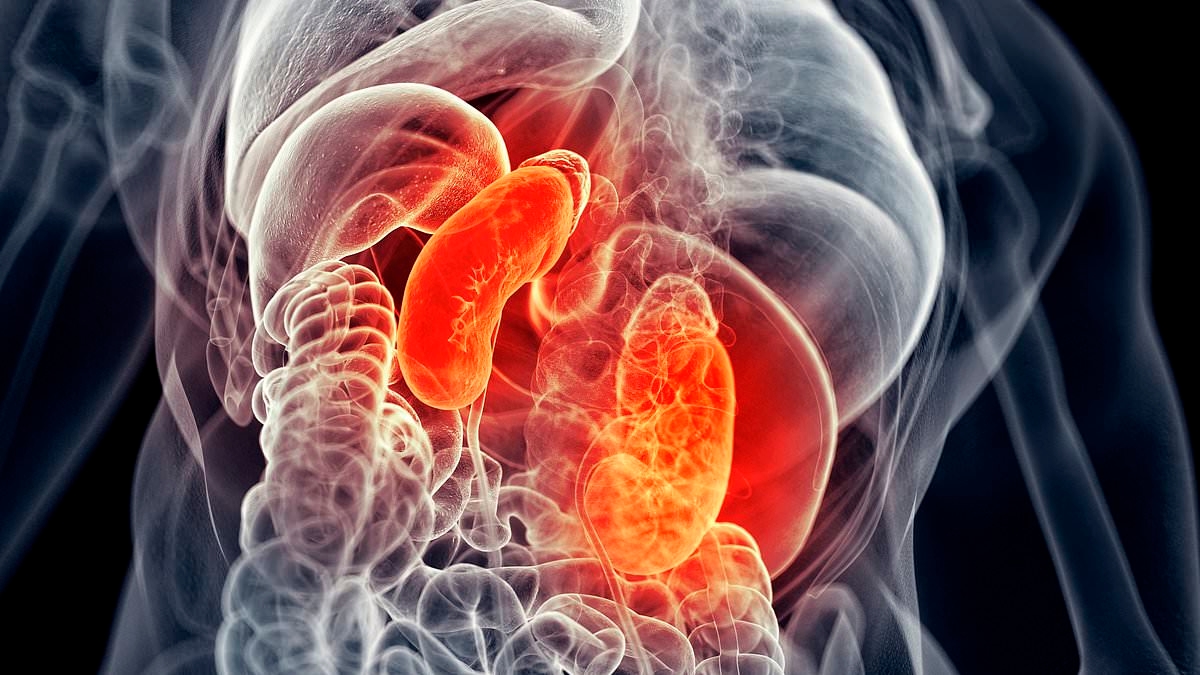Record number of Britons now enrolled on 800 calorie diabetes-busting 'soup-and-shake' diet

Published: | Updated:
The NHS soup and shakes diet is 'helping thousands' put their type 2 diabetes into remission, health service chiefs hailed today.
Figures show a record 13,000 adults in England were enrolled on the slimming plan last year — almost double the 6,401 patients in 2023, marking the highest total ever recorded.
Developed by a team at Newcastle University, the diet involves consuming just 800 calories a day for up to four months, in order to lose between 22lb and 33lb (10kg to 15kg).
This is enough, experts say, for most people to reverse the condition.
It is also known as the 'soups and shakes' diet because meals are replaced with low-calorie liquid variants.
Experts today claimed the 'proven NHS diet programme' was 'transforming lives' and 'reducing the risk of devastating diabetes-related complications'.
Research, however, has notably suggested that only 12 per cent of those who embarked on the brutal diet managed to stick to it for a full year.
Dr Clare Hambling, NHS National Clinical Director for Diabetes and Obesity, said: 'It is fantastic to see that this proven NHS diet programme is transforming lives, helping thousands of people to lose weight, and for some people put their type 2 diabetes into remission.
Developed by a team at Newcastle University, the diet involves consuming just 800 calories a day for up to four months in order to lose between 22lb and 33lb (10kg to 15kg)
'The revolutionary programme can really help turn things around for people with type 2 diabetes who are struggling to manage their weight and health.
'Alongside the low calorie diets themselves, patients are provided with one-to-one support and guidance to help them sustain a healthy lifestyle for longer.'
Costing around £1,100 per head, more than 30,000 people have now started the programme since its launch in 2020.
Adults are eligible if they have been diagnosed with type 2 diabetes in the last six years and if they have a body mass index score of over 27, or over 25 if they are from minority ethnic groups.
Under the regime, participants are given the low-calorie, nutrient-complete soup and shake diet for between 12 and 20 weeks.
They also get support from a nurse or dietitian to reintroduce healthy foods and maintain weight loss, while medications for type 2 diabetes and blood pressure are stopped.
One patient, Richard Seal, from the Midlands, hailed the plan as 'amazing' after shedding 63lbs (29kg) in three months.
The 62-year-old, who works as a regional chief pharmacist for the NHS, said: 'I went to my GP for my annual health check, and my blood pressure was high, so he asked me to do some blood tests.
One patient, Richard Seal, from the Midlands, hailed the plan as 'amazing' after shedding 63lbs (29kg) in three months. Pictured, Mr Seal before and after the brutal diet
'He said I'd gone from being pre-diabetic to being diabetic, and that he'd like me to consider enrolling in the NHS type 2 diabetes remission programme.
'I was more than happy to give it a go and was provided with a big box of soups and shakes — along with instructions on how to take them and measure my progress.
'I did a finger prick test every week to monitor my blood sugar levels and recorded my weight and levels of activity.
'I also had a lifestyle coach who helped guide me through the programme and support me to change my way of thinking about food in my life.'
He added: 'After just three months on the programme, my heart rate, blood pressure readings, cholesterol, and glucose levels were all back to normal. It was amazing.
'I lost over four and a half stone and eight inches from my waist during the programme, and I have a managed to control my weight since.'
But a major analysis of the NHS soups and shake diet data last year discovered that only 12 per cent of those who embarked on the brutal diet managed to stick to it for a full year.
The study, published in Lancet Diabetes and Endocrinology journal, was the first to test its effectiveness outside clinical trial settings.
Almost 4.3 million people were living with diabetes in 2021/22, according to the latest figures for the UK. And another 850,000 people have diabetes and are completely unaware of it, which is worrying because untreated type 2 diabetes can lead to complications including heart disease and strokes
It also discovered that a third of type 2 diabetes patients who followed the diet for a year lost weight and were in remission.
It means that, in total, only three per cent of patients who tried the diet actually achieved the desired result.
Of the 945 people went on to complete the diet for a year, on average they lost 15.9kg.
Extreme diet restrictions are unsuitable for some patients.
For example, if using insulin, calorie restrictions may lead to hypoglycaemia, where blood sugar levels fall too low.
Other unsuitable patient groups include pregnant or breastfeeding women, children and teenagers, and patients with eating disorders.
Type 2 diabetes occurs when the body doesn't make enough the hormone insulin, which is needed to bring down blood sugar levels.
Genetics, lifestyle factors such as the amount of exercise a person does, diet and obesity all play a role in causing the condition.
Having high blood sugar levels over time can cause heart attacks and strokes, as well as problems with the eyes, kidneys and feet.
Symptoms of the condition, which is diagnosed with a blood test, include excessive thirst, tiredness and needing to urinate more often. But many people have no signs.
Approximately 90 per cent of diabetes cases are type 2 diabetes, which is linked with obesity and is typically diagnosed in middle age, rather than type 1 diabetes, a genetic condition usually identified early in life.
Daily Mail






